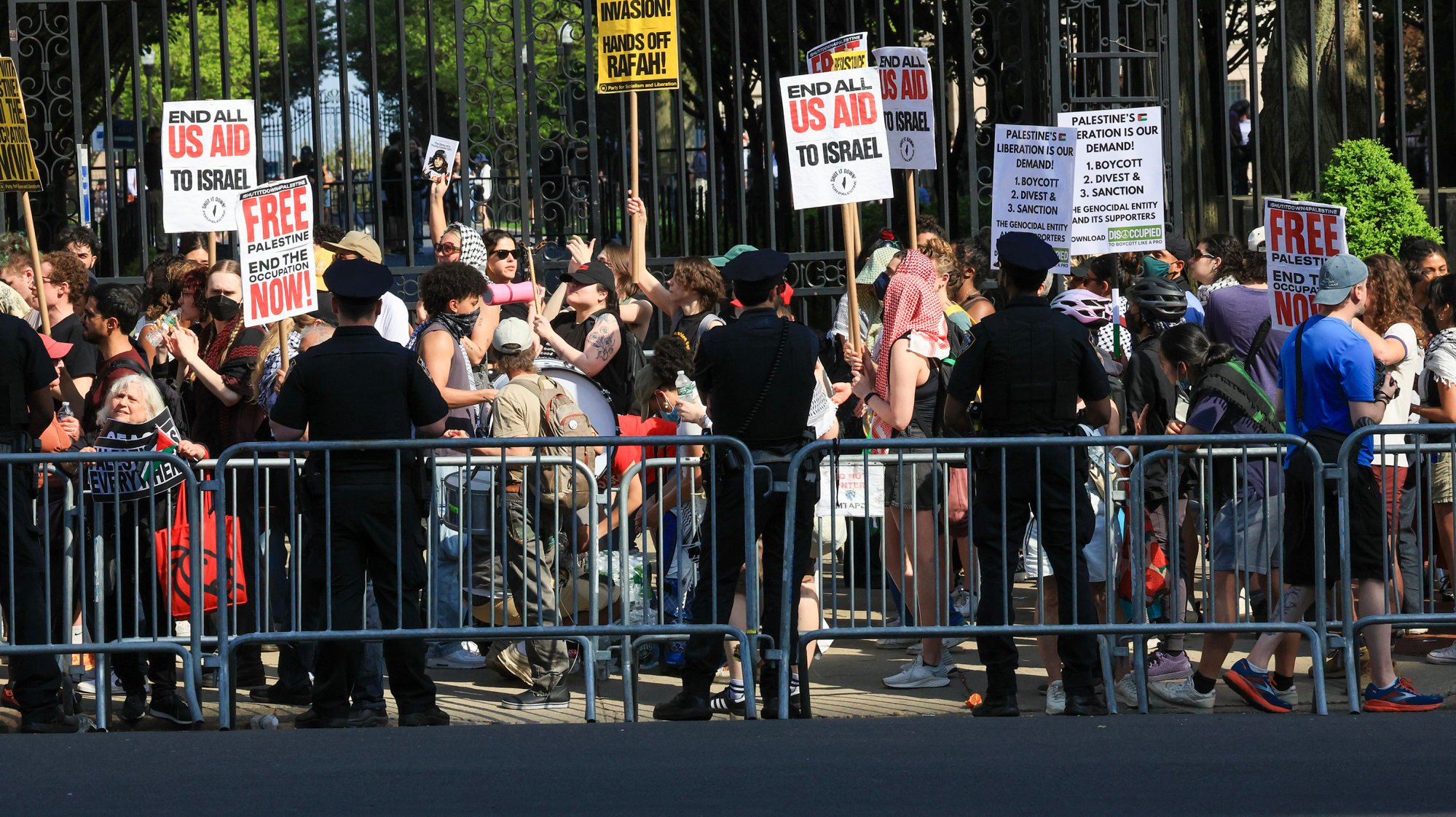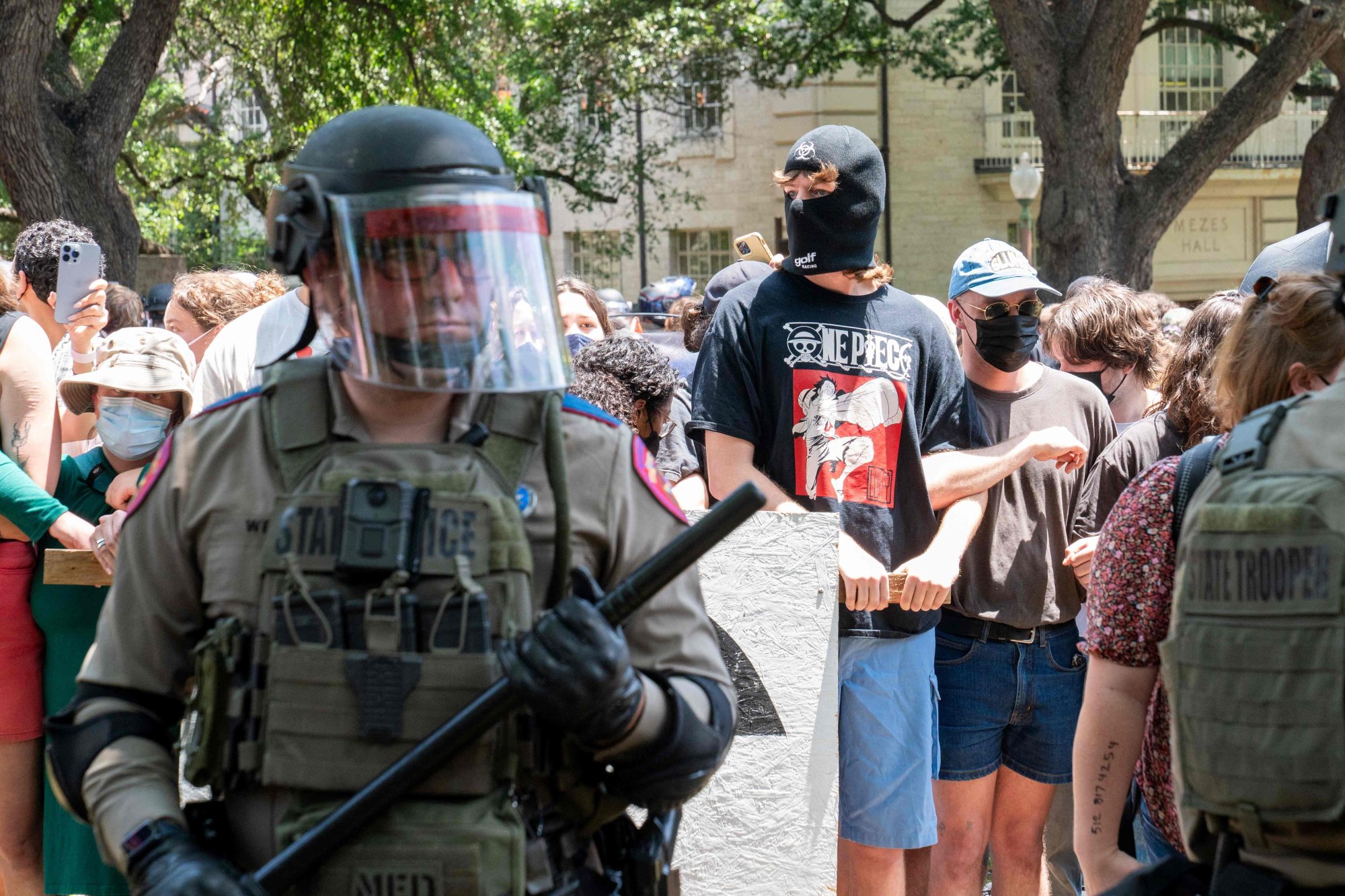Israel-Gaza war protesters arrested at University of Texas, Columbia University activists defy order to disband
In New York, Columbia began suspending students after activists defied a 2pm deadline to respond to the ultimatum, according to school spokesperson Ben Chang.
Instead, the students continued chanting, clapping and drumming from the encampment of more than 300 people. No officials appeared to enter the encampment, with at least 120 tents staying up as the deadline passed.
Hundreds of protesters marched around the quad, weaving around piles of temporary flooring and green carpeting meant for graduation ceremonies. A handful of counter-demonstrators waved Israeli flags, and one held a sign reading, “Where are the anti-Hamas chants?”

The notice sent by the Ivy League university in Manhattan said that if protesters left by the deadline and signed a form committing to abide by university policies through June 2025 or an earlier graduation, they could finish the semester in good standing. If not, the letter said, they would be suspended, pending further investigation.
“University representatives engaged in good faith dialogue with the organisers and maintain that dialogue,” Chang said. “We were hopeful and we were disappointed when the student protesters couldn’t reach consensus on the issues under discussion.”
Early protests at Columbia, where demonstrators set up tents in the centre of the campus, sparked the pro-Palestinian demonstrations across the country. Students and others have been sparring over the Israel-Gaza war and its mounting death toll. Many students are demanding their universities cut financial ties with Israel. The number of arrests at campuses nationwide is approaching 1,000. The protests have even spread to Europe, with French police removing dozens of students from the Sorbonne university after pro-Palestinian protesters occupied the main courtyard.
College classes are wrapping up for the term, and campuses are preparing for graduation ceremonies, giving schools an extra incentive to clear encampments. The University of Southern California cancelled its main graduation ceremony.
But students have dug in their heels at some high-profile universities, with stand-offs also continuing at Harvard, the University of Pennsylvania, Yale and others.
Tensions flare at US universities over Israel-Gaza war protests
Yale said in a statement on Monday that while it supports peaceful protests and freedom of speech, it does not tolerate policy violations such as the encampment. School officials said that the protest is near residential colleges where many students are studying for final exams, and that permission must be granted for groups to hold events and put up structures on campus.
In a rare case, Northwestern University said it reached an agreement with students and faculty who represent most protesters on its campus near Chicago. It allows peaceful demonstrations until the June 1 end of spring classes, requires removal of all tents except one for aid, and restricts the demonstration area to allow only students, faculty and staff unless the university approves otherwise.
And at Brown University in Rhode Island, school President Christina H Paxton offered protest leaders the chance to meet officials to discuss their arguments for divestment from Israel-linked companies in exchange for ending an encampment.
In the letter to student protesters at Columbia, school officials noted that exams are beginning and graduation is coming.
“We urge you to remove the encampment so that we do not deprive your fellow students, their families and friends of this momentous occasion,” the letter said.
Under the terms spelled out in the letter, students who leave the encampment would be put on disciplinary probation until June 2025. Students who are already receiving discipline, or who face harassment or discrimination charges for actions in the encampment, are not eligible for the offer.

Columbia’s handling of the protests has prompted federal complaints.
A class-action lawsuit on behalf of Jewish students alleges a breach of contract by Columbia, claiming the university failed to maintain a safe learning environment, despite policies and promises. It also challenges the move away from in-person classes and seeks quick court action requiring Columbia to provide security for the students.
Meanwhile, a legal group representing pro-Palestinian students is urging the US Department of Education’s civil rights office to investigate Columbia’s compliance with the Civil Rights Act of 1964 for how they have been treated.
A university spokesperson declined to comment on the complaints.
The plight of students who have been arrested has become a central part of protests, with the students and a growing number of faculty demanding amnesty for protesters. At issue is whether the suspensions and legal records will follow students through their adult lives.